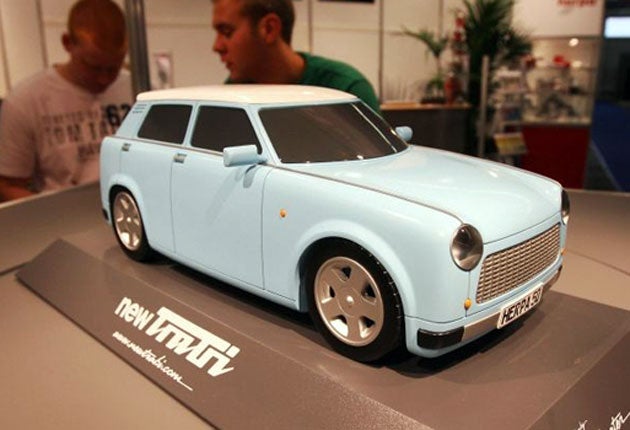Slow, smelly and made of plastic – the Trabant gears up for electric comeback

Your support helps us to tell the story
From reproductive rights to climate change to Big Tech, The Independent is on the ground when the story is developing. Whether it's investigating the financials of Elon Musk's pro-Trump PAC or producing our latest documentary, 'The A Word', which shines a light on the American women fighting for reproductive rights, we know how important it is to parse out the facts from the messaging.
At such a critical moment in US history, we need reporters on the ground. Your donation allows us to keep sending journalists to speak to both sides of the story.
The Independent is trusted by Americans across the entire political spectrum. And unlike many other quality news outlets, we choose not to lock Americans out of our reporting and analysis with paywalls. We believe quality journalism should be available to everyone, paid for by those who can afford it.
Your support makes all the difference.The smoke-belching cars are still affectionately held symbols of communism's abject failure and when the Berlin Wall fell, hundreds of thousands of them put-putted their way through the gaps in the Iron Curtain into the capitalist west.
Former East Germany's infamous Trabant was, and still is, a smelly, two-stroke engine car made out of plastic, cotton and wood. Its top speed is 60mph and under communism even model citizens had to wait an average of 12 years to get one.
"It was the car that gave communism a bad name," is how commentators summed up the vehicle, universally referred to as the Trabi.
It still rarely fails to appear on lists featuring the world's worst cars.
Yet now, and on schedule for the 20th anniversary of the fall of the Berlin Wall this November, the Trabi is due to make a surprise comeback.
However, this time it will be the model German car of the future – both Green and electric. A modernised electric-engined prototype called the "Trabant nT" is to be unveiled at Frankfurt's International motor show next month.
IndyKar, a private company which has developed the new vehicle, aims to attract investors to manufacture them en masse.
There are 50,000 of the original cars still registered in Germany and many take part in organised "Trabi rallies". In Berlin tourists hungry for a bit of communist nostalgia can hire them to drive round the city.
IndyKar spokesman Jurgen Schnell insists that the new Trabant will not be a retro car: "It's going to be simple, practical and in the tradition of the original. But it will have the newest technology and be purely electric."
The new Trabi has been designed as a city car, equipped with a roof-top solar panel for recharging its battery. "The German government says it wants to see a million electric cars on the road by 2020 and we wanted to fit into this concept," Mr Schnell said.
His company hit on the idea two years ago after noting the huge popularity of miniature Trabants sold by the Herpa model car company. A poll showed that 93 per cent of people wanted the Trabi back on the road. Many said they would buy a new one.
Join our commenting forum
Join thought-provoking conversations, follow other Independent readers and see their replies
Comments